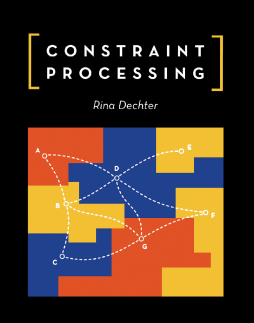
Additional Information
Book Details
Abstract
Constraint satisfaction is a simple but powerful tool. Constraints identify the impossible and reduce the realm of possibilities to effectively focus on the possible, allowing for a natural declarative formulation of what must be satisfied, without expressing how. The field of constraint reasoning has matured over the last three decades with contributions from a diverse community of researchers in artificial intelligence, databases and programming languages, operations research, management science, and applied mathematics. Today, constraint problems are used to model cognitive tasks in vision, language comprehension, default reasoning, diagnosis, scheduling, temporal and spatial reasoning.
In Constraint Processing, Rina Dechter, synthesizes these contributions, along with her own significant work, to provide the first comprehensive examination of the theory that underlies constraint processing algorithms. Throughout, she focuses on fundamental tools and principles, emphasizing the representation and analysis of algorithms.
- Examines the basic practical aspects of each topic and then tackles more advanced issues, including current research challenges
- Builds the reader's understanding with definitions, examples, theory, algorithms and complexity analysis
- Synthesizes three decades of researchers work on constraint processing in AI, databases and programming languages, operations research, management science, and applied mathematics
“I wholeheartedly recommend it to students, researchers and practitioners in artificial intelligence, constraint programming and operations research who want to know more about the theory of constraint processing.
— Roland H.C. Yap, National University of Singapore, in Theory and Practice of Logic Programming
“It is beautifully written and presents a unifying framework capturing a wide range of techniques for processing symbolic, numerical, and probabilistic information.
— Bart Selman, Cornell University
“If you want to understand why this technology works, and how to make it work for you, then I recommend you read this book.
— Toby Walsh, Cork Constraint Computation Centre
“The book is rigorous but it is not difficult to read. An abundance of examples illustrate concepts and algorithms.
— Pedro Meseguer, Institut d’Investigació en Intellingència Artificial – Consejo Superior de Investigaciones Científicas (IIIA-CSIC)
“An indispensable resource for researchers and practitioners in AI and optimization.
— Henry Kautz, University of Washington
“I strongly recommend reading this book to everyone who wants to know what is behind constraint satisfaction technology and I think that this book should definitely be in the bookshelf of everyone who teaches constraint satisfaction.
— Roman Barták, Faculty of Mathematics and Physics, Charles University in Prague, Czech Republic
